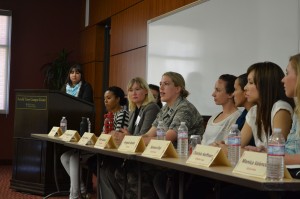Female students talk rewards, challenges in the military
Students and faculty gave an all-female panel of students a standing ovation after they shared personal anecdotes about influence their military service’s role in shaping their outlook.

Honor · Panelists discuss how their experience in the military has translated to their lives as students, sense of self and future goals. – Mindy Curtis | Daily Trojan
More than 50 students attended “USC Women Who Have Served: The Military Experience from a Female Perspective,” part of the monthly Campus Conversation series hosted by the Office of Campus Activities. The Tuesday event, which was the final installment of the 2012-13 series, garnered one of the largest turnouts.
All of the panelists, who are enrolled as USC students this year, shared their reasons for enlisting in the military. Many of the panelists said they enlisted because they felt a personal responsibility that was instilled from family members.
“I didn’t come from a military family,” said Stephanie Soltis, a first-year masters student in the Marshall School of Business who served as a pilot in the Air Force in Iraq and Afghanistan. “My family always talked about the importance of public service. Joining the military was the best route to go to achieve that.”
Lauryn Riley, a first-year in the Gould School of Law and a coach for the women’s club rugby team, said political events during her teenage years drove her to enlist.
“I was in high school during 9/11,” said Riley, who graduated from West Point and served one tour in Iraq. “It was a formative time during my life, and I wanted to help out in anyway I could.”
Though their inspirations differed, all the panelists agreed that their experiences in the service instilled a strong sense of confidence and identity that continues to translate to all areas of their lives.
“I learned to accept personal responsibility in life,” said Charlsie Hoffman, an international relations-global business major who served five years in the Marine Corps. “I don’t feel like things are out of my hands, [and] I don’t make excuses anymore. The military has opened so many doors for me. I can do anything; it’s my choice and the military gave that to me.”
But panelists said that, while their time in the military was invaluable and rewarding, they also had to fight against stereotypes and gender-based hardships during their service.
“Some people think we are the weaker sex,” Riley said. “They think we are not physically or mentally capable of what we do, but I wanted them to understand that I was there on my own merit and fully capable of doing everything they could.”
The challenges didn’t end there, however. Many veterans experienced crash courses in death and grief, learning to cope while focusing on their own duties.
“My hardest challenge was the first time anyone under my command ever died,” Soltis said. “We knew it wasn’t our fault, but you feel that responsibility because it’s our job. I had to figure out how to deal with that personally and be a good leader for the crew. And I was only 25 years old.”
The veterans said they face a new set of challenges in civilian life, as well. Casey Whitson, an MBA student who is currently on active duty as operations flight commander for USC’s Air Force ROTC program, described how she balances her life as a mother, wife, student and professional.
“I put the same effort into every part of my life that I do the military,” Whitson said. “You just have to be very disciplined, get things done, be focused and be a quality to your family when you are there.”
Many students walked away from the event inspired by the veterans’ stories.
“I know what it’s like on the other side,” said Keith Williams, a second-year law student at Gould who also served in the military. “To hear their personal stories from their perspective and know what they had to go through, it makes it a lot different because I can envision it from personal experience.”
Those who have personal relationships with the panelists said they see how the panelists’ military experience is reflected in their civilian lives.
“I found it to be very enlightening and [I was] surprised at what they need to go through balancing personal lives and being in service, and [I] couldn’t imagine putting my life on the line,” said Naa Adei Mante, a sophomore majoring in electrical engineering who is coached by Riley on the rugby team.
The panelists’ discussion also offered guidance to some students who are considering enlisting in the military.
“This is giving me a better idea of my decision,” said Rebekah Lee, a junior majoring in kinesiology who was considering enlisting in the military after graduation. “I really like how empowered these women are and that’s a big factor [in my consideration]. They found themselves and the confidence they found is really great.”
Though each student took away different lessons from the conversation, ultimately, panelists stressed the importance of military women being able to define themselves on their own terms.
“I don’t like to focus on [stereotypes] because it gives a sense of reality to them,” Hoffman said, referring to the misconceptions of women in the military. “I’d like people to focus on what you got from us today.”

I did not attend the panel and it does not indicate in the DT article, but I would be interested to know if the topic of sexual assault against women in the military was discussed and how the prevalence of it affected the panelists.